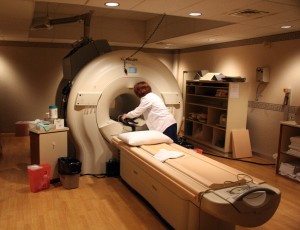Among the 45 tests and procedures the campaign says to "question" are: annual EKGs for patients at low risk of heart disease; MRIs for back pain; and antibiotics for mild-to-moderate sinusitis. The operative word here is "question." Some callers to Forum worried insurance companies would use this information to deny payment, depriving those who might need the test or procedure of something that would be helpful. But Dr. Lucey explained that this is a campaign that was developed by physicians. She said insurance companies had not been involved in the process at all.
"This is not about denying these tests. This is not saying that these tests don't make a difference for some patients," Dr. Lucey said. "It's saying many times they don't. For instance, nuclear cardiologists said 45 percent of routine screening cardiac procedures, stress tests using nuclear radiology, are done for people who don't benefit from those tests, so why do them?"
It was about this time that Forum welcomed Dr. John Santa to the program. He's director of the Health Ratings Center of Consumer Reports which partnered with the doctor's groups in developing this campaign. (Note: Consumer Reports is generally not a group I associate with supporting rationing).
At the heart of the Choosing Wisely campaign is an acknowledgment that patients and doctors need to share in the decision making about a patient's treatment. If a patient wants a test or treatment that is unlikely to benefit them, the doctor needs to explain that. Conversely, if your doctor recommends something to you, you should ask questions. As Dr. Santa noted, Consumer Reports has 75 years of history telling consumers about virtually every industry, including what products work well and what products don't. Now, they find the same desire for information in health care.
"Our surveys of consumers overwhelmingly say they want to have those kinds of conversations," Santa explained. "They are more and more concerned about cost. They're concerned about safety."
But this is where I need to digress from Forum (although I think the entire show is worth a listen; the embedded player is below). I fully support avoiding treatments that are not going to benefit a patient. I also support the concept of shared decision making. The problem is that patients, in general, have so much less knowledge and expertise than doctors.
And this brings me to the story of my good friend Saskia van Dijl, someone who is both smart and forceful. She recently developed a severe kidney infection and was hospitalized at a well-respected Bay Area hospital. When I visited her in the middle of her three day stay -- a Saturday -- she looked awful. She was receiving IV antibiotics. And she was concerned. While her doctor had not told her directly, the nurses told her they had found an order for a "PICC" line -- a peripherally inserted central catheter. It would be inserted in Saskia's arm, to access a major vein for administration of drugs, like the antibiotics Saskia was receiving.
But PICC lines are prone to infection, and Saskia knew that. She wanted to switch to oral antibiotics when she went home. When the doctor came later, Saskia was clear with her doctor. "I asked point blank," she told me. "'Are you absolutely sure there's not an oral antibiotic that would be as effective?' ... I asked that question three times in three different ways. Lisa, I can't even tell you, I really did not want the PICC line. I felt like it was way too much." But the doctor was clear. Saskia got the PICC line -- and had to stay in the hospital another night.
The next day, a new doctor was on duty. She took another look and saw a new option, based on Saskia's bacterial culture. There was an oral antibiotic that could work for her. Saskia asked if the first doctor could have known this, and the answer was 'yes.' Within twenty minutes the PICC line was out, and Saskia went home with oral antibiotics. She has recovered fully.
Add the cost of Saskia's PICC line to that one-third of unnecessary health care in this country.
I caught up with Dr. Lucey after Forum and told her Saskia's story. She said when a patient pushes back as strongly as Saskia had, it should prompt the doctor to take a second look at the options. "Stop, let's re-think this," she said. Of course, Saskia could have demanded a second opinion. But by the time the first doctor got back to her, it was Sunday--not a great day for looking for doctors for second opinions. It's also hard to rebut a doctor who is telling you "this is your only option" when you're quite sick and lying in a hospital bed.
I've watched the discussion back and forth for years. Patients say doctors never explained all the risks. Doctors say, "Patients walk into my office and demand all these tests." The Choosing Wisely campaign which explicitly acknowledges doctors' role in overtreatment is a step forward. Still, if groups of specialists could come up with 45 tests that are generally unnecessary, one might wonder why they didn't come up with the list a long time ago.
Dr. Lucey told Forum listeners, "Like any other individuals, sometimes we fall into habits. And this campaign is suggesting we need to critically evaluate those habits."
Hundreds of billions of dollars could be saved if those habits are changed.
